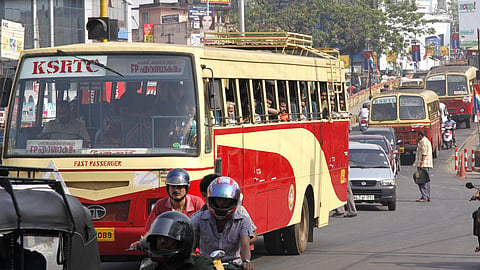

Kerala’s once-prominent public transport system, particularly its extensive fleet of buses, is experiencing a decline, posing a paradox to the state’s development model. The disappearance of efficient and affordable public transport raises concerns about equitable development. While private ownership of vehicles, especially two-wheelers, has grown, at a faster rate than the population growth, it has not been able to ensure the accessibility that affordable public transport once ensured. Recent reports reveal challenges such as increased travel time, traffic jams, and unavailability of adequate parking spaces. Apart from the cost to the economy due to the above challenges, the rise in the number of private vehicles also poses a challenge to the state’s commitment towards reducing carbon emissions.
Kerala’s public bus services, both private and public combined, declined from 1.3 per 1000 population in 2000 to 0.31 in 2023. It is currently lower than the national average of 1.2 for 1000 people. Private sector buses ensured connectivity within cities and peri-urban regions and even extended their services to remote areas prior to the year 2000. The decline has been sharp between the period before the onset of the Covid pandemic and the period after it. There were 12,900 private buses operating in Kerala in 2018. The number has come down to 7,300 in 2023. Similarly, there were only 4,200 Kerala State Road Transport Corporation (KSRTC) buses operating in 2023 as against 5,662 in 2018. However, the easy availability of credit and rising income led to a shift wherein those who used to commute on buses began relying on private vehicles, particularly two-wheelers.
Household vehicle ownership in Kerala, highlighted by the National Family and Health Survey 2019-20, stands at 58.6% for two-wheelers and 24.2% for four-wheelers. This contrasts with the bus availability of 0.31 per 1000 population, while cars and two-wheelers stand at 91 and 290 per 1000 population respectively. The rise in private vehicle ownership adversely impacts the profitability of public transport, with many private bus owners leaving the business due to declining demand and mounting operational costs. The subsequent decline in bus services further fueled the rise in the use of private transport vehicles, resulting in a significant drop in bus commuters from 1.32 crore in 2013 to 64 lakh in 2023.
Also, despite the improved road infrastructure post-2000, public transport has not adapted to the changing needs, causing inconvenience to commuters, especially students and women who are engaged in low-paid work. Bus connectivity with the educational institutions played a major role in improved access to education in Kerala from the 1980s onwards. Post-2000, Kerala witnessed significant infrastructure growth, with total road length increasing from 1.24 lakh km (1999-2000) to 2.31 lakh km (2022). Road density is now 548 km per 100 sq m, nearly three times the national average. Bridges and flyovers have also sprung up, connecting remote areas. Despite KSRTC’s perceived poor performance, a decline in private sector bus departures due to losses are often overlooked, revealing complex transportation dynamics.
Despite significant improvements in the standard of living and transport infrastructure, public transport in Kerala has not adapted to meet the evolving aspirations of the people. Bus routes remain unchanged despite increased connectivity with nearby towns and highways, leading to longer and time-consuming journeys. The delay in upgrading the quality of buses and the service on offer, coupled with negative public experiences with bus operators (both KSRTC and private), has also prompted people to abandon public transport. While air-conditioned buses were introduced a decade ago, many were withdrawn from service post-pandemic. The middle-income segment’s abandonment of public transport has muted the public outcry about the lack of services.
Kerala is a densely populated state and cannot sustain the increase seen in its private vehicle population in recent years. A comprehensive revamp of the public transport system is needed. This includes optimising school and college buses during downtime, devising financial models to incentivise private operators, leveraging technology for efficient bus tracking, and exploring options like pre-purchased redeemable bus cards akin to metro cards. On top of these, incentivising government and private employees with prepaid redeemable bus coupons can generate revenue.
To fund daily public transport, the government can encourage employees to allocate a portion of their salary as a prepaid bus coupon, generating a minimum of `100 crore monthly which can meet the daily running expenses of the KSRTC. Similarly, the private sector employees can also contribute a small portion of their salary towards bus coupons, thereby helping create a fund for private operators to the tune of at least `100 crore. This can be used to subsidise a portion of the per-service expenses for private owners catering to minimum commuters. To ensure success, strategic planning of routes and services by KSRTC and the private sector is vital, along with collaborating with local self-governments for feeder services using unused buses from schools and institutions during the daytime.
Revise KSRTC’s structure through the use of technology and public participation in management as in schools and government health centres to monitor services and enhance efficiency. To discourage private vehicle use, the government should introduce parking fees for staff vehicles in office premises. Promotion of public transport by private and public enterprises would support Kerala’s moves to cut its carbon footprint thereby aligning with Environmental, Social, and Governance (ESG) principles.
In conclusion, Kerala needs a comprehensive overhaul of its road transport system to address the challenges posed by the rise in private vehicle ownership.
Resmi P Bhaskaran
Policy analyst
(Views are personal)